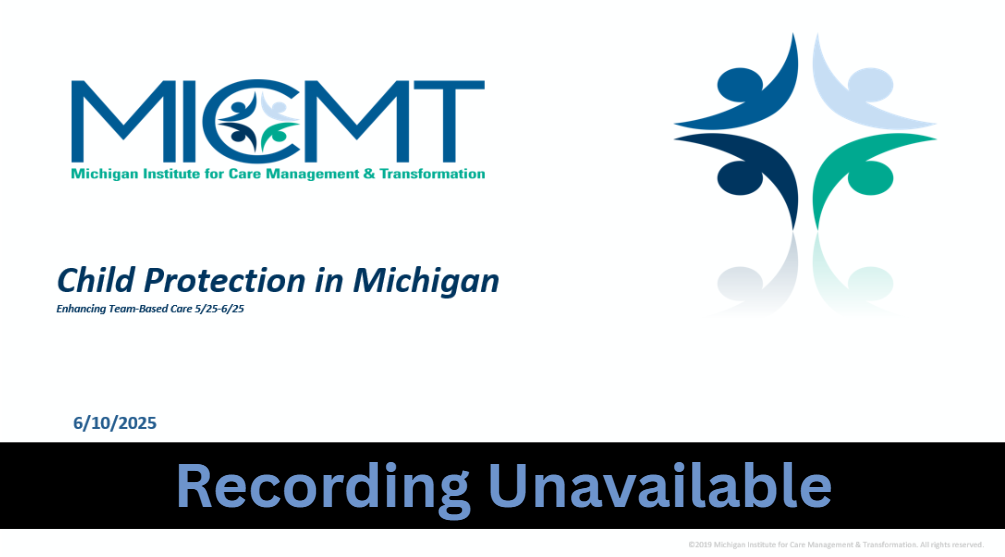Filter by:
Topic: Community Health Worker Meeting: Sustainability of the CHW Role
Discussion lead by: Linny West
Physician Organizations: CIPA, PTI, IHP, UP
Nada M. Farhat, PharmD, BCPS, BCACP
Clinical Lead
MICMT
Training Opportunity for Medical Assistants.
Open to all medical assistants interested in gaining knowledge in medication reconciliation best practices.
This training will focus on medication reconciliation best practices, specifically for medical assistants. A description of workflows and the importance of medication safety in the ambulatory care setting will also be discussed.
For those interested in a more comprehensive 2-day training, please view our Event Calendar for the latest opportunities:
View Future Opportunities for Optimizing Medication Reconciliation: Role of Care Team Members - Two Day Training
- Describe medication reconciliation components and the significance of medication reconciliation
- Discuss the specific role of medical assistants with regard to medication reconciliation
- Review medication reconciliation best practices
- Identify red flags and high-risk medications that may impact patient safety
Successful participants will receive a certificate of completion, which will count towards the 8 hours of longitudinal education requirement. Continuing Education (CEs) Credits will not be offered for this training.
Molly Achard, LMSW
PRISM
This webinar will explore risk factors and common stressors of the perinatal period and approaches for addressing perinatal mental health concerns in Collaborative Care. Behavioral health care managers will learn assessment strategies and effective behavioral interventions for use with perinatal patients.
Michael A. Smith, PharmD, FCCP, FAAHPM, BCPS
University of Michigan
This presentation will explore the intricate relationship between pain and trauma, providing healthcare professionals with essential knowledge and skills to enhance patient care. Attendees will delve into the physiological and psychological connections between trauma and pain perception, aiding in improved assessment and diagnosis of patients experiencing both conditions. Through case studies and interactive discussions, participants will learn to create and implement holistic, evidence-based treatment plans that address the complexities of co-occurring pain and trauma. This session is designed to equip professionals with a comprehensive understanding and practical tools for effective, trauma-informed, patient-centered care.
Jim Kraft, Ph.D,
Advance Care Associates
Facilitating Meaningful Advance Care Planning Conversations
For Care Managers, Social Workers & Community Health Workers
Molly Crump, LMSW
PRISM
This engaging and interactive webinar will take a deep dive into behavioral activation specifically focusing on the application to Collaborative Care in primary and specialty care environments. Participants will have the opportunity to practice their skills in a supportive learning environment.

Jordan Carter (she, her, hers), State Administrative Manager
Children’s Protective Services & Redesign
Prevention, Preservation & Protection Division
Children’s Services Administration
Michigan Department of Health and Human Services
This session will provide an overview of Children's Protective Services (CPS), mandated reporting, the CPS investigation workflow, case categories and service array, and court process.


RECORDING UNAVAILABLE
The slide deck from this presentation is available.
Cynthia Farrell, Division Director of Adult Services
Michigan Department of Health and Human Services
This session will describe APS' authority, review and understand mandatory reporting responsibilities and how APS investigates reports. Additionally, we will identify abuse, neglect and exploitation within adult individuals.

Sarah Fraley, LMSW
Mind/Body Health Consultants, PLLC
Effective teamwork requires open, honest, and productive communication—even when conversations are tough. This interactive webinar will provide practical tools for giving constructive feedback, engaging in conflict with professionalism, and working toward alignment with colleagues.

Debbra Snyder-Sclater, MS, LLP, CAADC, CCS
Project Manager
Department of Psychiatry
Michigan Medicine
This engaging and interactive webinar will take a deep dive into the steps of problem-solving treatment specifically focusing on the application to collaborative care in primary and specialty care environments. Participants will have the opportunity to practice the 7 steps of problem solving in a supportive learning environment.
